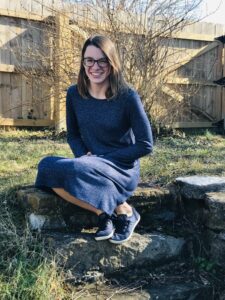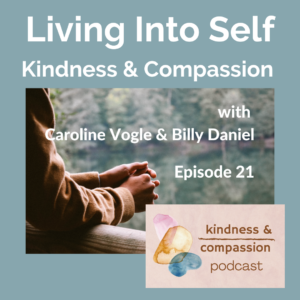 In this episode, Gordon has a conversation with The Rev. Caroline Vogel and The Rev. Dr. Billy Daniel about how we can practice kindness and compassion by reaching out to those around us, offering a helping hand, and showing understanding and empathy. They also talk about ways to build bridges between different communities, cultures, and beliefs by listening to each other and trying to understand one another’s perspectives. One of the most important practices to foster kindness and compassion is self-compassion. Self-compassion is the practice of being kind to oneself and recognizing that we all make mistakes and have flaws. It is important to recognize that we all have our own unique set of experiences and that we can learn from our mistakes.
In this episode, Gordon has a conversation with The Rev. Caroline Vogel and The Rev. Dr. Billy Daniel about how we can practice kindness and compassion by reaching out to those around us, offering a helping hand, and showing understanding and empathy. They also talk about ways to build bridges between different communities, cultures, and beliefs by listening to each other and trying to understand one another’s perspectives. One of the most important practices to foster kindness and compassion is self-compassion. Self-compassion is the practice of being kind to oneself and recognizing that we all make mistakes and have flaws. It is important to recognize that we all have our own unique set of experiences and that we can learn from our mistakes.
Introducing Billy and Caroline
I’m so glad for you to get to know Caroline Vogel and Billy Daniel. They are friends of mine from my work in the Episcopal Church. Both Caroline and Billy are Episcopal priests serving in Knoxville, Tennessee at Church of the Ascension.
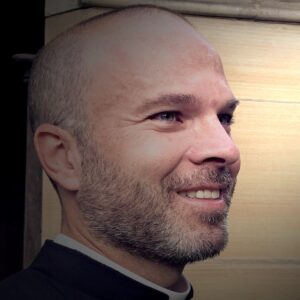 The Rev. Dr. Billy Daniel is a priest, poet, theologian and the rector at Church of the Ascension and author of Christ in the Liturgy and Inhabited By Grace; The Incarnate Way of Love. Billy works with congregations and individuals to help deepen their spiritual lives. He has a podcast, Fr. Billy Daniel which features sermons, homilies and spiritual reflections.
The Rev. Dr. Billy Daniel is a priest, poet, theologian and the rector at Church of the Ascension and author of Christ in the Liturgy and Inhabited By Grace; The Incarnate Way of Love. Billy works with congregations and individuals to help deepen their spiritual lives. He has a podcast, Fr. Billy Daniel which features sermons, homilies and spiritual reflections.
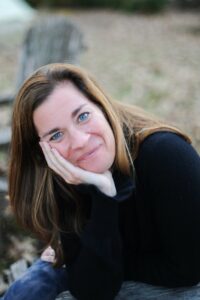 The Rev. Caroline Vogel serves as The Director for Spiritus Knox a center for spiritual learning and practice in Knoxville, Tennessee. Spiritus Knox is a gathering place for anyone and everyone who is looking for some sacred space to find some ease and spiritual wellness and connect with others seeking to do the same. We offer weekly gatherings on Sunday Evenings in addition to retreats throughout the year. On occasion we have the good fortune to host authors to share about their books, passion and connect with us who seek to explore with them. You can learn more about Spiritus Knox at our website: www.spiritusknox.com. Caroline also has a podcast, Mindful Christians; living embodied faith.
The Rev. Caroline Vogel serves as The Director for Spiritus Knox a center for spiritual learning and practice in Knoxville, Tennessee. Spiritus Knox is a gathering place for anyone and everyone who is looking for some sacred space to find some ease and spiritual wellness and connect with others seeking to do the same. We offer weekly gatherings on Sunday Evenings in addition to retreats throughout the year. On occasion we have the good fortune to host authors to share about their books, passion and connect with us who seek to explore with them. You can learn more about Spiritus Knox at our website: www.spiritusknox.com. Caroline also has a podcast, Mindful Christians; living embodied faith.
Make Space for Community
Caroline said that what we’re trying to do in Ascension is really make space for people to reimagine what the church is and how they can be part of it. How they can connect to it so that they experience a new way of living out their spiritual life and connecting with God. They are fond of saying “Ascension as a seminary for the city, which is really a fancy way of saying that we are a space that cultivates a certain kind of soil that enriches the community and the lives of those around us.”
Why do we need kindness and compassion
Gordon has been thinking about the need for kindness and compassion for a while. “One of the things that I really noticed in my work as a therapist is that how much people were hurt.” He notices just how isolated people are from each other. “How do we live into more kindness and compassion, not only with each other, but with ourselves because we, we have a relationship to ourselves first and then to the world.”
Gordon has been working with people in the therapy office and also serving in the church. He works with people that have been through trauma. People who have been through some horrific things in their lives. He works to help people find much greater sense of contentment and peace in their lives by the different ways they can practice kindness and compassion.
Ways to practice kindness and compassion
How do you help people move past the polarization in our society and embrace kindness and compassion? The practices are very simple but complicated at the same time. People need to find something that works for them.
One way to practice more kindness and compassion is mindfulness. Just being self-aware. Being aware of what is going on for you internally as well. Mindfulness is being able to think about what you’re thinking about. Being aware of that and how it’s affecting you physically and emotionally and spiritually.
Another way is the practices of gratitude are really looking at what you have rather than what you don’t have. Be aware of what you have and be grateful.
As simple as this sound is, doing simple acts of kindness out in the world increases our capacity to experience kindness and compassion. And so that just kind of behavior perpetuates itself. Living into kindness and compassion is really getting curious about others. Being kind can get us unstuck from the loop of criticism and defensiveness. Change that up. Instead of becoming defensive when we’re faced with something that maybe we don’t agree with or faced with criticism of some sort, is to get curious about what is going on with that other person in their life. Ask questions and just get curious with the other person.
Give room for kindness and compassion
We all have a filter. When we become more aware of our filter it gives us room to be able to see things from another perspective. Gordon has an optical illusion in his office that can look like a young woman or an old woman, depending on how you look at it. Is it an old woman or is it a young woman? And the truth of the matter is it’s not either or it’s both. One of the things about leaning into kindness and compassion is being willing to embrace both and rather than the either or. This opens us up to empathy, allowing room for kindness and compassion. When you understand what is going on in the background for someone, then there is no room for the spirit of judgment.
Deeper awareness by practicing kindness and compassion
No matter how much they pour their heart open to us, we do not know exactly what they are going though. It’s their story. When they share it with us, and we receive it as they offer it with a nonjudgmental and curious posture it enables us to receive them as they are. Which again opens us to a deeper awareness of who they are. We create a kind of space together. We all become more fully alive in the process. And, and that’s the whole beauty of the spirit of generosity, this curiosity and receiving. Practice listening. Practice being curious the whole time. Practice holding them gently. That is the essence of kindness and compassion.
Show notes by James Marland, CCS
Caroline: And Compassion With a guest. With a guest. Gordon Brewer. So Gordon, will you tell us a little bit about yourself?
Gordon Brewer: Well, sure. Thanks for, thanks for having me. Yes. I'm a, um, I'm a deacon in the Episcopal Church and so, uh, uh, really a deacons ministry is really more in the world than anything else. But I'm a licensed marriage and family therapist in private practice in Kingsport t.
and I work with both, uh, couples and individuals on just, uh, any array of, of, you know, problems that people might have. And, um, yeah. And then the other thing that I do that I think is a lot of fun is I also have a podcast called The Kindness and Compassion. Podcasts where really, um, it's a podcast about ending the, kind of the division and polarization in the world and really looking at how we can look at the intersection of psychology, religion, spirituality, and how we can live into more kindness and compassion in our lives.
Wow, that's great.
Caroline: That's wonderful.
Gordon Brewer: Okay. Okay, so
Billy: let's see.
Gordon Brewer: It's not picking up quite as well as I hoped for, but
Billy: like Sarah,
Gordon Brewer: the sign there? No, but
Caroline: she's got crispy her donuts.
Gordon Brewer: Okay. First name and last name again. Billy Daniel. Billy Daniel. I wanted to say Bob. I don't know why. Billy. Bob. Billy Bob? Mm-hmm.
Okay. All right, here we go. Hello folks, and welcome again to the podcast and I'm so glad for you to get to know today. Caroline Vogel and bought Billy.
Caroline: Daniel .
Gordon Brewer: I had Billy Bob in my
Caroline: head. Sorry I messed you up. That's
Gordon Brewer: good. All right, we'll start over. Okay. My fault. My fault. It's okay,
Well, hello folks and welcome again to the podcast and I'm so glad for you to get to know Caroline Vogel and Billy Daniel, who are friends of mine from my work in the Episcopal Church. But welcome Caroline and.
Caroline: Thank you. Thank you. Thanks for, thanks for having us. We're excited to be on your podcast.
Gordon Brewer: Yes.
And as I start with everyone, why don't you tell folks a little bit about yourself and how you've. Landed where you've landed. Mm.
Billy: You should go first.
Caroline: Okay. So, so I'm Caroline and I'm an Episcopal priest serving in Knoxville, Tennessee at Church of the Ascension. Billy and I actually serve there together.
Um, I serve as the associate priest for, um, adult formation and we started a new center called, uh, spirit Two Snacks, which is a center for spiritual learning and. Um, we're offering a variety of things, including retreats and, uh, teaching people about different spiritual tools. And one Sunday night we get together and breathe together.
Mm-hmm. . Um, we have a Celtic service and a, um, a book study each month. So we're just doing a, a lot of different kinds of things to help people experience community. Around, uh, their spiritual lives. Mm-hmm. , um, maybe especially those that, uh, Sunday morning's not quite working for them anymore or not working so well.
Um, yeah,
Gordon Brewer: yeah, yeah.
Billy: So, yeah. So I'm Billy Daniel. I'm the, uh, rector at Church of the Ascension in Knoxville, Tennessee. I've been here for all of eight. And I am an Episcopal priest and, and grateful to serve here in Ascension and, and to be a part of a lot of the stuff that we are doing. And so, as Caroline mentioned, she's the director of Spirit two Snots, which is a new initiative, uh, that we started in March, maybe June, June.
June. It was June. June. And, and there. What we're trying to do in Ascension is really make space for people to, um, reimagine what the church is and, and how they can be part of it and connected to it so that they experience. Um, a new way of living out their spiritual life and connecting with God. And, and part of that's through initiatives like Spirit Two, snots Others is something I'm fond of saying is, um, Ascension as a seminary for the city, which is really a, um, a fancy way of saying that we are a space that cultivates.
Um, a certain kind of soil that enriches the community, the lives of those around us, so that we foster growth all over. And, and so I'm grateful to be there and it's, it's good work that we're doing. And so thanks for having us here on the podcast.
Gordon Brewer: Yes, it's really needed work and just bringing, getting people to think about their spiritual lives in maybe a much different way.
Yeah. That's it. Mm-hmm. . Yeah.
Okay. Is that good to, just for the intro? Yeah. That's good. Mm-hmm. . Okay.
Caroline: Okay. So now we'll do the body.
Gordon Brewer: Okay. Okay.
Billy: So we'll, um, how do we wanna start? We gonna start it as a
Caroline: Why don't, Hmm.
Why don't we, why don't we start by talking, although, how would that work for your podcast if we're talking about, well, spiritual practices of kindness and compassion?
Gordon Brewer: Yeah, we can. Well, we can. You know what we can do? I'm not sure exactly. My mine is very conversational. Yeah, yeah, yeah. Yeah. And so I think it'll work in that.
Okay,
Billy: fabulous. So maybe we do, um, a separate little piece. Mm-hmm. where we talk about where we do, we kind of already do that.
Caroline: We kindness and compassion.
Billy: Yeah. I dunno what you're. I'm just thinking, do we need a separate set of, well,
Caroline: why don't we do the, why don't we just have the conversation and I think we'll know what we need after we have the conversation.
Gordon Brewer: Mm-hmm. . Great. Yeah.
Caroline: So I'm so excited to have this conversation today about kindness and compassion. Mm-hmm. and, um, Gordon, let's, let's start with you. Yes. Um, since you have a whole podcast on kindness and compassion, how did you get interested? Um, what, why, why a podcast on kindness and compassion.
Gordon Brewer: Well, it's a, it, it's something that I've been thinking about for, for some time, but I think as much as anything, I think, um, hopefully we can, we can safely say here, post Covid, one of the things that I really noticed in my work as a therapist is that how much people were hurt.
Um, just around being isolated from each other. But then on top of that, we had a whole, this whole phenomenon of the, the George Floyd murder and mm-hmm. and all of the polarization that we're seeing in our country and just around, around the world. And one of the things that I wanted to do was just have conversations with folks around.
How do we live into more kindness and compassion, not only with each other, but with ourselves because we, we have a relationship to ourselves first and then to the world, and so really just learning from other people how they're living into that. And with that comes an intersection I think for most people into the, into the realm of spirituality.
Kind of my purview has been working with people in therapy and psychology and that sort of thing. I wear two hats and then I'm a clergy person in the church, but also, um, You know, work with people that have been through trauma, been through some horrific things in their lives, and really just helping people find much greater sense of contentment and peace in their lives by the different ways they can practice kindness and compassion.
Billy: So you, you mentioned practice, so that's something we are pretty keen on. Mm-hmm. , um, especially in talking about on, on our own podcast, becoming fully alive and. What are the practices? Like what, what maybe what are the practices that you notice? That you are making accessible to people that you work with mm-hmm.
that really is helping them to foster that kindness and compassion and move past the polarization in, in their own
Gordon Brewer: lives. Right. Right. That's a great question. And the thing about it is, is that, So I like to think about the practices is that they are, um, very simple but complicated at times. , I mean, there's just a lot of different avenues and I think that people, when they are, um, when they're really seeking it, um, they have to find something that works for them.
But the things that come to mind, and these are familiar terms that I think a lot of people are hearing. One is mindfulness just being. Self aware and aware of what is going on for you internally, um, of being able. Mindfulness is really, I, I think of it as being able to think about what you're thinking about.
Mm-hmm. and being aware of that and how it's affecting you physically and emotionally and spiritually and that sort of thing. The practices of gratitude are really looking at what you have rather than what you don't have, and really trying, trying to, um, You know, figure out what those things are. The other thing too, or just as simple as this sound is, is just doing simple acts of kindness out in the world.
You know, one, one little thing that, uh, gets started in my town sometimes there's a, we've got a local, um, kind of fast food restaurant called pals, and it's, uh, it's this really kind of quirky kind of drive through kind of thing. But every now and then somebody. Drive up to the drive through and they'll say, let me pay for the person behind me.
Mm-hmm. . And so that just kind of perpetuates itself and that sort of thing. Um, the other thing too, I think in living into kindness and compassion is really getting curious about others. Uh, one, one of the things that can happen. Just in relationships is we can get stuck in this loop of, of criticism and defensiveness.
Mm-hmm. and, and if we become aware of that, we can change that. Change that up instead of becoming defensive when we're faced with something that maybe we don't agree with or faced with criticism of some sort, is to get curious about what is going on with that other person in their life. Yeah. And so being able to ask questions and just get curious with the other person.
Mm-hmm. . Yeah.
Caroline: We've been talking a little bit about the spirit of generosity. Mm-hmm. , so that the assumptions that we make about people, the way that we're curious, that we're being generous in that approach, right? Mm-hmm. , that, that we're assuming the best instead of assuming the worst and, um, And I appreciate that what you're talking about, where you started with around mindfulness and being aware mm-hmm.
of how we're thinking, you know? Mm-hmm. and how we're thinking about how we're thinking. Mm-hmm. and cuz I think that that plays out a whole lot more than, than we know that it does. Mm-hmm. , right? Mm-hmm. the lens in which we're seeing someone or a situation, uh, really has a huge impact on what happens next.
Gordon Brewer: Yes. Yeah, absolutely. We, we, we, we all have a filter and, and it's, um, we don't, um, I think when the more we can become aware of our filter, It gives us room to be able to see things from another perspective. Mm-hmm. , I was, I was sharing as, as we're recording this, we were at a, a clergy retreat and we were sharing, uh, in our groups just about some different things around, um, you know, what, what are our vulner vulnerable places?
And, um, you know, the context at which we were sharing it was the scripture just around. Um, Mary Magdalene going to the empty tomb, and what was her experience around that? But one, one of the things, an image, a metaphor that came up for me is that, um, I have this picture that I, I use with clients in my office sometimes, and it's an optical illusion of this and a lot of people have seen it.
It's, uh, if you look at it one way, it looks like an older woman. And if you look at it another way, it looks like a younger. It. And one, one of the things that we have to do in order to see it one way or another is our brain has to make this switch. Mm-hmm. . And so one of the things that I do for fun is ask people, okay, what is it a picture of?
Is it an old woman or is it a young woman? And the truth of the matter is it's not either or. It's both. And it's both and yes. And, and so I think one of the things. Living into kindness and compassion is being willing to embrace the both and rather than the either or.
Caroline: Yes. And, and one thing that I'm finding myself really curious about, and I've been curious about this for a while, is how, and you, you named it quickly earlier.
Um, Our practice of self-compassion. Mm-hmm. , and I really appreciate Kristin Neff's work on this. Mm-hmm. , and she breaks it down into three main things of, do I talk to myself, the way I would talk to someone that I love. Um, a sense of common humanity. Mm-hmm. , um, you know, is. Remembering that I'm not the only one who's ever been through this.
I'm not the only one who's ever had this emotion, um, or felt like this. And then with a sense of a sense of mindfulness mm-hmm. , um, and, and being aware. Of, you know, how we're feeling and, and, and providing ourselves. Mm-hmm. some, some, some empathy around our own feelings. Not being afraid to feel the feelings.
Right. Um, and, and I think it's so interesting what we do as Christians. With self-compassion. Like I've worked with people who really struggled. I mean, my, myself at times. Mm-hmm. struggled with, you know, is it okay to be compassionate towards myself? Mm-hmm. , I mean, is that, is that even Christian? Yes. You know, is that, is that okay?
Mm-hmm. , do you run
Gordon Brewer: into this? Yes. You know, one, one of the things that, um, we can do, and this is something I've had to learn for myself, and we, Caroline and I were having the conversation earlier about the Enneagram and the fact that I'm an Enneagram two and one of the things that two Engram two s can fall into as we can be real in tune with helping others, which the Engram two is the.
Helping others, but we, we don't know how to help ourselves. Mm-hmm. . And one, one, again, a metaphor that I like is if you think about, um, when we fly and you get on a plane, and the first thing they do is go through this safety routine, and the one thing they tell you about that is that the oxygen mask comes down is to put your own on first.
Mm-hmm. . Because if you're not taking care of yourself first, Our ability to take care of others is greatly diminished. Yeah. And so I think that, you know, I think a lot of times we think about as being maybe a little selfish or I'm just thinking about myself, but really if you think about it, it is, is a way of really making sure that we.
Or have our best ability to help others. Um, yeah. Yes.
Caroline: Right. Because if we keep sacrificing ourselves, we really don't have much to authentically mm-hmm. , um, be able, be able to, to offer in terms of kindness or compassion with
Gordon Brewer: other people. Yeah. Yeah.
Billy: Yeah. And I like how you kind of began, um, as we started having this conversation with gratitude mm-hmm.
as, as one of those practices. And, and it seems at as, um, as we were just kind of talking about self-compassion and, and having compassion for others, I just wonder about the practice of being grateful. And, and that sense of gratitude and, and how it might open us to a deeper sense of compassion and even self-compassion.
Mm-hmm. and because it, it orients our attention toward the things that, that are actually helping us flourish as per persons. Yes. Right? Yes. And, and can, um, Maybe Reor reorient us just enough that the thing that, uh, we might be struggling with, um, doesn't consume us. Yes. Doesn't consume our attention. And then from that space of gratitude, we can look back on
Mm-hmm. , whatever that might be, with a certain kind of kindness.
Gordon Brewer: Yes. Yes. It's, you know, it's interesting with, uh, my work as a therapist, um, Work with a lot of folks struggling with depression, anxiety, and those kinds of things. And when you think about it, when people are really in the throes of depression or if they're struggling with anxiety, which those two, those two states are go hand in hand.
Mm-hmm. , I mean, it's just that you don't, you very rarely see one without the other, but it's a very much an inward focus. You know, they get consumed with what's going on with themselves. Mm-hmm. and when they can, when they start to heal, you see that shift of focus of being more outward. Yeah. They, they start being able to engage with the world more, engage with others more, and, and also being able to, you know, that whole focus of changing of from what I don't have to what I do have.
Yes. And so, yeah.
Billy: And it cultivate. So gratitude cultivates a certain kind of mindfulness, right? Mm-hmm. , mm-hmm. . And, and the more I become mindful of things for which I am grateful, it, it opens me to a deeper awareness of other people in, in a compassionate way. And, and what I'm, um, just thinking about my own experience, there's, there's a sense in which when I can name the things for which I am grateful.
I become a little bit more sensitive to all the things. That makes it hard for others to be grateful. Mm-hmm. and, and when I can be a little bit curious about how hard it was initially for me to start naming all the things for which I'm grateful mm-hmm. and still do it. I, I know that somebody else might be having that same struggle mm-hmm.
and, and I can remain curious with them, with the spirit of generosity, knowing. Hmm. Maybe there's something I can do to help them shift their orientation toward gratitude. Mm-hmm. , instead of going, that person's driving me crazy. Yes. Mm-hmm. , I, I can't stand when they do that. Mm-hmm. . So instead of entering that space of judgment from that place of gratitude, I begin to think, Hmm, how might I be a conduit?
Gratefulness mm-hmm. so that they too might, uh, enter that space with me and, and we can walk this way together. Right,
Gordon Brewer: right. Yeah. It's a, it's a, one way I think about this as well is. Being able to learn the other person's story. Yeah. Because when you, when you understand what is going on in the background for, for someone, then that, that judgment can kinda, it gives us room to not be so judgmental.
Mm-hmm. , because we understand. What they've been through, what they, what their life has been like. Why, why they might see the world as they see it. Or as I ask my clients a lot of times, as you know, why do, why do you think you are like you are? Yeah. You know, what has, what, what are the things that have happened to you in your life to be able to, to operate in this way?
And the thing about it is, is that most of us, We don't realize it until we start practicing mindfulness and gratitude and those kinds of things. Um, we can, there, there's a little part of our brain called the amygdala and it's there totally to keep us safe and to keep us alive. And what happens is, is that we, when we're traumatized or we, we are, you know, going through hard times or whatever, that part of our brain can kind of take over.
And so we're operating out of fear and out of, um, in a survival mode and when we can get curious with others. That gives them a little more safety and then we can begin to have a conversation and that it's a safe place for them to be and, and, and, and that sort of thing. Yeah.
Billy: It, you know, it really, it really gets that, um, that space is something we create together.
Mm-hmm. , you know, it's not just something we occupy at the same time mm-hmm. , but we're actually cultivating space with others by. , we relate to them. Yes. So kindness, generosity, gratefulness, and so I mean, what you just put your finger on that sense. If, if I can be curious and, and have that spirit of generosity toward another person.
It really opens them to that new vulnerable space that they may have been waiting for. Mm-hmm. , but not quite sure how to enter in. Right, because it wasn't there. And so we create it together. Mm-hmm. and, and as we live into it together, the space that we're creating, it enables us all to experience that deeper aliveness in, in a safe, in that safe space that we are creating.
Gordon Brewer: Yes, yes. Yeah. Yeah. It's, uh, yeah. You know, it's kind of. . You know, every time I see you, Caroline, I'm always reminded of Brene Brown . I just, I know you're a big fan as well, but one of the, one of the lines that she uses a lot is the story we tell ourself. Mm-hmm. , but we also tell stories to ourselves about others.
Totally. And so, well, we can get some truth around the story about the. That opens up a whole new possibility. Yes.
Caroline: And you know, one of the things I've been thinking about too though, is we don't always have the privilege of knowing someone else's story. Right? Right. I mean, for a variety of reasons. We may never know.
Um, and it are there ways in which even without getting to know the story, we can still come to the table, come to the conversation. Hold that person, um, with a regard of, of a spirit of generosity and, and with kindness and compassion, even if we don't know mm-hmm. and we may never know.
Gordon Brewer: Right.
Billy: Yeah. Cause we, cause we, we can't fully understand another person's story.
No. No matter how, how much they pour their heart open to us. Mm-hmm. . Because it's their story and, and so they share it with us, and if we hold that with them and receive it as they offer it mm-hmm. then, then it does in that nonjudgmental posture enable us to remain curious mm-hmm. and, and actually receive them as they are.
Mm-hmm. , which, which again opens them to. A deeper awareness of who they are. Yes. Um, a deeper awareness of the goodness of life. That's all around us. And, and, and we, again, create a kind of space together and, and, and we all become more fully alive in the process. And, and that's the whole beauty of the spirit of generosity, this curiosity mm-hmm.
and, and being responsible to. That aliveness in others. Mm-hmm. , not just thinking, oh, that's how they are, but just receiving them. Mm-hmm. listening and, and just really, really being curious the whole time. Mm-hmm. and holding them gently. Mm-hmm. .
Gordon Brewer: Yes. Yeah. And that to me, that's the essence of kindness and compassion.
Mm-hmm. , I mean, that's just being able to, um, That, that gentleness that you, you speak of is, is really because there's, um, you know, all of us, uh, are, are fragile in different ways and being able to have, um, compassion for that fragility. Am I making a word here? But, um, yeah, and, and I think that's really where, where it starts, where we can really begin to change.
The discourse that we have with people. Mm-hmm. . Um,
Caroline: and I think too, that Jesus has so much to teach us about this. I mean, throughout the gospels,
Billy: that's how you bring up Jesus everywhere. Right. So
Caroline: much to teach. So much to teach is that he, but he's constantly, I mean, compassion is about turning towards Yes.
And, and with a, like a, a warmth in our being and in a sense of just like you're saying, And Billy's saying too gentleness and, um, and, and Jesus turns towards so many people, uh, who everybody else has written off. And, and not only written off, but have justified themselves for not turning towards, it's like, oh, well, I'm not gonna turn towards them.
Like that's, that would make me unclean. Or that. So there's all these ways and we, we still. We have all these ways that we don't turn towards people. Mm-hmm. , um, it's painful to turn towards people who are hurting and suffering and in pain and, and yet that's the example of Jesus over and over again.
Gordon Brewer: Yeah.
It comes, it comes back down to vulnerability of being able to have the courage to be vulnerable with, with others. Yes. And even, you know, Being able to approach someone that you know is maybe hurting or is, is struggling with life or they're just, they're, they're being outcast by everybody.
Caroline: Well, and this is where I think self-compassion is so incredibly helpful too, right?
Gordon? Is that. Um, when I turn towards someone else's pain and I'm not okay and haven't been present to my own mm-hmm. , it makes it really hurt hard to turn towards because it's going to touch down in my own pain. Oh yeah. We're social creatures. It's how it happens.
Billy: Well, because what we're doing right is we're.
We're turning away from ourselves and our own pain. Mm-hmm. . And so, so before we can turn toward others, we need to turn toward ourselves and just Right. Sort of own it and work through it and find our way through and be gentle toward
Caroline: ourselves. Yes. Mm-hmm. . But, and I guess you're right, that, that it does work both ways in that sometimes we dodge our own pain and suffering by turning towards someone else's.
Mm. and sometimes we don't turn towards other people's pain because somehow some way it's gonna touch down in our own. Right. Right, right. So whatever way you flip the coin mm-hmm. , you do have to turn towards your own pain. Mm-hmm. . And the more you can do so with kindness and compassion. Yeah. Following that example of Jesus that.
The better it's gonna go not only for yourself, but when you turn towards other people. Right. Um, in a genuine place of serving rather than I have to, or I should, or it's the right thing to do. Mm-hmm. . Cause people know when you're turning towards them. Mm-hmm. in a true spirit of generosity with an open, big, open, grateful heart.
Mm. For life versus turning towards their pain cuz they're that like drudgery. Mm-hmm. , you know, like, oh God, I can't believe I have to be doing this right now. Right. And people can feel it regardless of the words that you use.
Gordon Brewer: Right, right. And I think that's what, you know, here we are talking about Jesus. I think that's why Jesus drew people in, because people sensed his, his genuineness and the fact that he.
You know, and just embody that, that way of being,
Caroline: that that deep level of care. Mm-hmm. . Yeah.
Gordon Brewer: Yeah.
Billy: And. And gentleness is a fruit
Caroline: of the spirit. I know. I was thinking the same thing. It is one of the fruits of the spirit. Yes.
Billy: And I love, you know, Paul writes in his letter to Titus, he says, um, let your gentleness be known by all mm-hmm.
Mm-hmm. . And, you know, and Paul has a wonderful way of talking about these things. You know, the only, the only place where Paul talks. Competing is to compete in love. Mm-hmm. , the only thing that you need to let everybody know about is your gentleness. Yes. And, and it's just wonderful. You know, these are, these are not prideful things.
These are, these are ordinary practices to which we give our lives as followers of Jesus. Mm-hmm. and, and just good humans in the world. Mm-hmm. that enable. To have, have a shared sense of our humanity to live gently. I mean, I, I think, uh, is it amus, um, uh, live gently while comely with God? Mm-hmm. and gentleness is such a part of what it really means to be human.
Yes.
And
Caroline: Oh, and how we have forgotten that. Yeah.
Gordon Brewer: Oh, well, let's say, you know, it's how we start out in life. Mm. I mean, that's, that, that is absolutely what we have to have when we're born. Mm. The baby has to be held. Mm-hmm. , and it has to be gazed. The mom and mom and dad need to gaze into the baby's eyes with love and gentleness and kindness, and, and if that doesn't, , then bad things start happening.
Mm-hmm. , and we carry that all the way through our lives. Yeah. I mean, it's, we have this innate desire to connect in that way. Yes. You know, we, we mess it up with a lot of other stuff in lives, in our lives, but at our very core, we have to have that gentleness and that that closeness and the, the, just the, the image of, you know, a mom holding her.
It. Mm-hmm. is, is what we, what we. What we have to have in order to, in order to thrive. In order to thrive.
Caroline: That's what I was thinking too, in order to thrive. Yeah. You know one thing about this too, though, um, Kristen Neff, going back to her work for a minute, her most recent book is called Fierce Compassion.
And she talks about this yin yang of compassion, that we think of it as this gentle, uh, motherly warm, and there is that side of compassion. And we also have to bring in. That other side of compassion, um, that calls sometimes for action, that calls for that tougher love mm-hmm. . Um, and, and it's really that, that creates a wholeness.
Yes. Um, And, and I, I have appreciated even chewing on that.
Gordon Brewer: Yeah. It's a, it's about, you know, it's that balance between being open with people and vulnerable with people, but also having boundaries Yes. To that. Yes. I mean, it's, um, you know, I think about a toddler, you know, a toddler wants to explore and, and get out, but if they don't have those boundaries, don't have, you know, a parent or a caregiver to reign them in.
That can, that can get outta control for them. So we need need those, both the both of those pieces. Yeah. Mm-hmm. , I think it's
Caroline: important. Well, wow. This has been a great conversation.
Billy: I know. It's been fabulous.
Caroline: It's been wonderful, Gordon, thank
Gordon Brewer: you. Yes, yes. Thank you all.
Billy: Thanks for the work that you're doing.
Thanks.
Sign up to receive email updates
Enter your name and email address below and I'll send you periodic updates about the podcast.
About
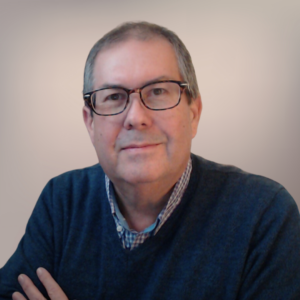
L. Gordon Brewer Jr., LMFT |Podcast Host – Gordon has spent his career in helping professions as a licensed therapist, counselor, trainer, and clergy person. He has worked with 100’s of people in teaching them the how to better manage their emotions through self-care and the practices of kindness and compassion. Follow us on Instagram and Facebook . And be sure to subscribe to our newsletter.

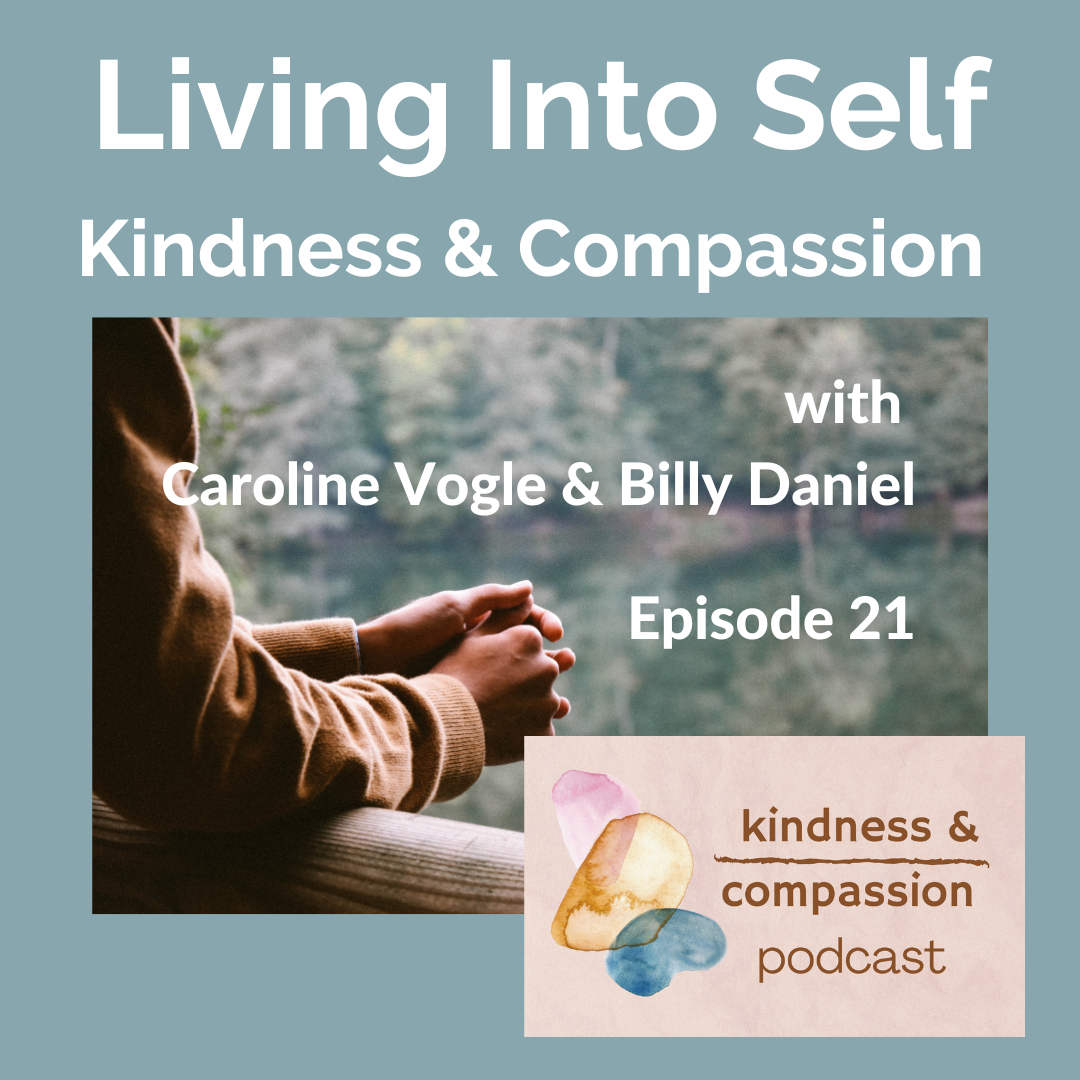
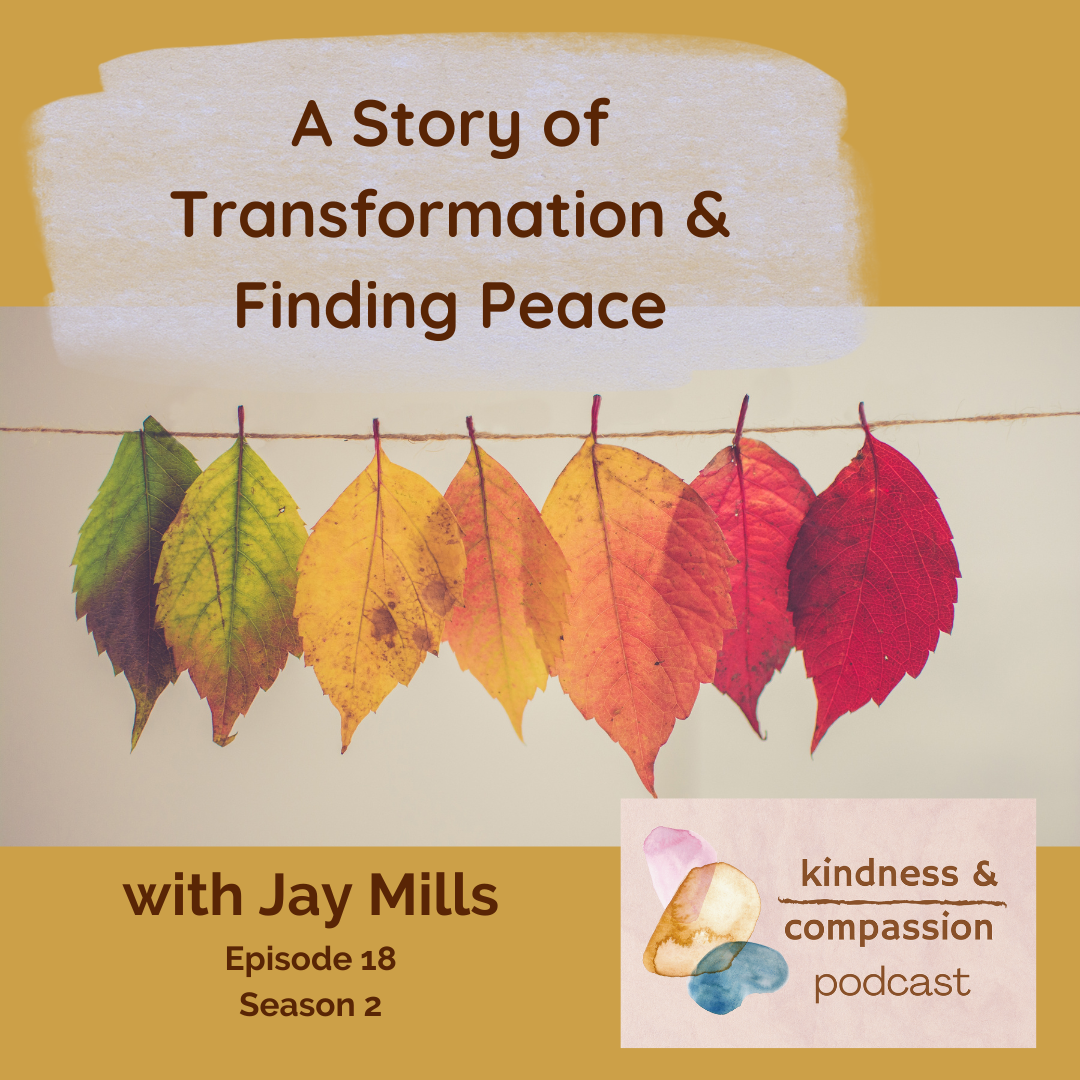
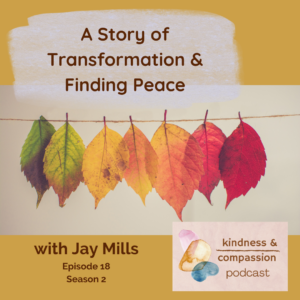
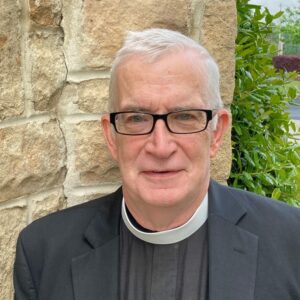 The Rev. Jay Mills was raised in a middle-class home with parents that were reasonably good parents. And I ended up getting sexually assaulted when I was 12 years old, and my life very quickly unraveled. Jay started doing drugs and alcohol heavily. He ended up being addicted very young. He was also a really angry kid with a lot of violence. He lived that way until he was about 21, where he went through a conversion through the ministries of Campus Crusade for Christ. While he does not agree with their theology now, he says “I owe them my life cause as I’ve often said, if I waited for the Episcopal Church to evangelize me, I’ve died in a drug house.
The Rev. Jay Mills was raised in a middle-class home with parents that were reasonably good parents. And I ended up getting sexually assaulted when I was 12 years old, and my life very quickly unraveled. Jay started doing drugs and alcohol heavily. He ended up being addicted very young. He was also a really angry kid with a lot of violence. He lived that way until he was about 21, where he went through a conversion through the ministries of Campus Crusade for Christ. While he does not agree with their theology now, he says “I owe them my life cause as I’ve often said, if I waited for the Episcopal Church to evangelize me, I’ve died in a drug house.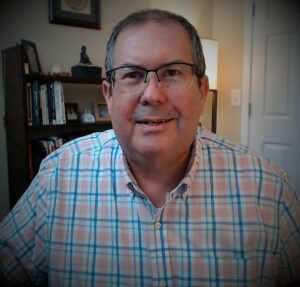
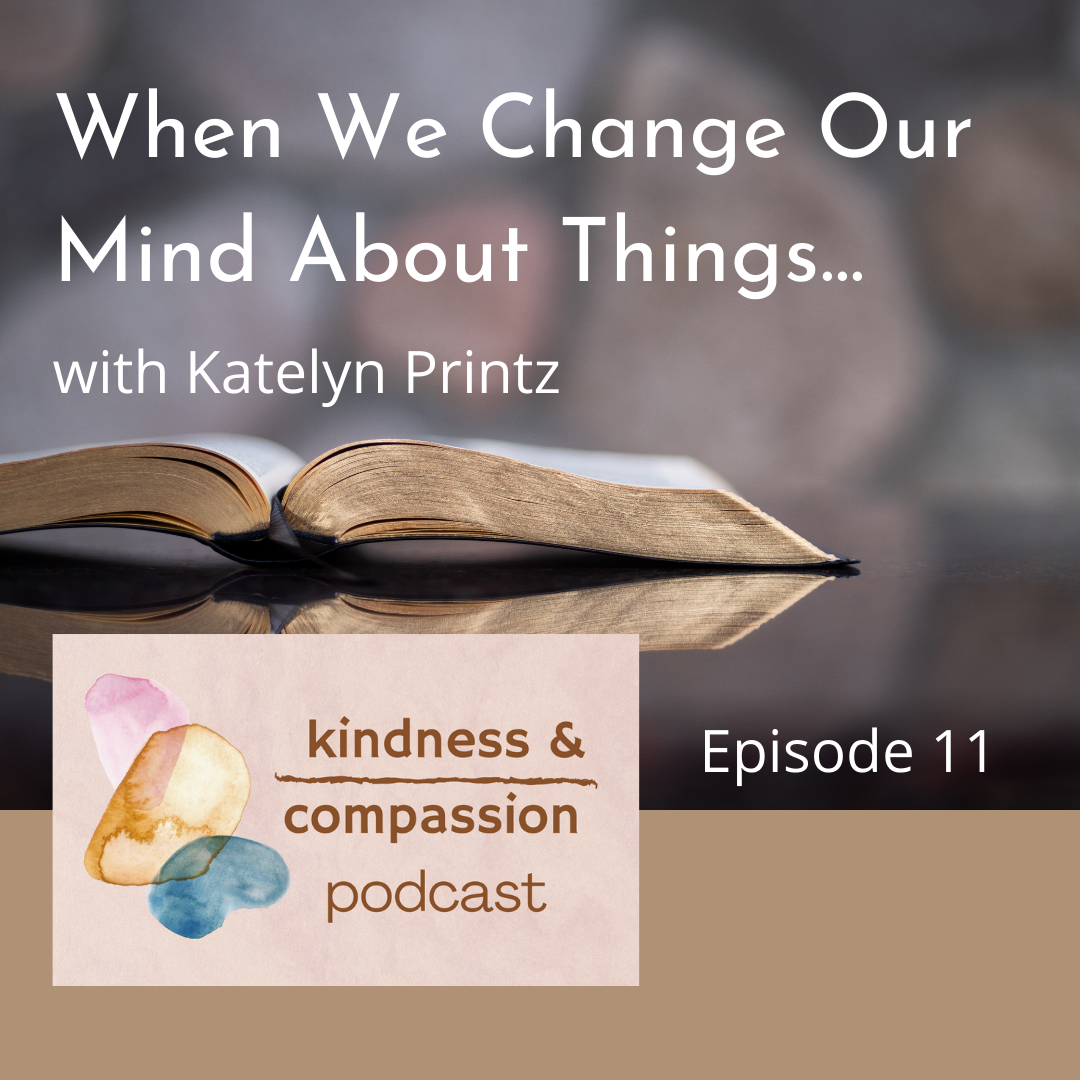
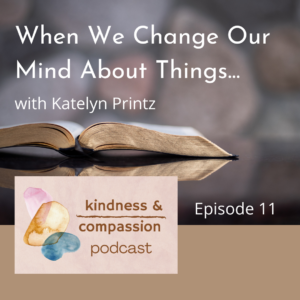 In this episode, Katelyn Printz joins us to talk about the process she went through in changing her mind about some things. Katelyn shares her story about growing up with some fairly narrow conservative Christian views. As an undergraduate in college, Katlyn’s eyes were opened up to various ways of thinking, allowing her to reconsider some of the opinions she had as a child. Katelyn speaks about the importance of allowing your faith to be a continuous process as you grow and learn. Tune in as we chat about the many ways to love and worship and why it’s critical to have kindness and compassion for yourself and others as they make changes to their faith and beliefs.
In this episode, Katelyn Printz joins us to talk about the process she went through in changing her mind about some things. Katelyn shares her story about growing up with some fairly narrow conservative Christian views. As an undergraduate in college, Katlyn’s eyes were opened up to various ways of thinking, allowing her to reconsider some of the opinions she had as a child. Katelyn speaks about the importance of allowing your faith to be a continuous process as you grow and learn. Tune in as we chat about the many ways to love and worship and why it’s critical to have kindness and compassion for yourself and others as they make changes to their faith and beliefs. 